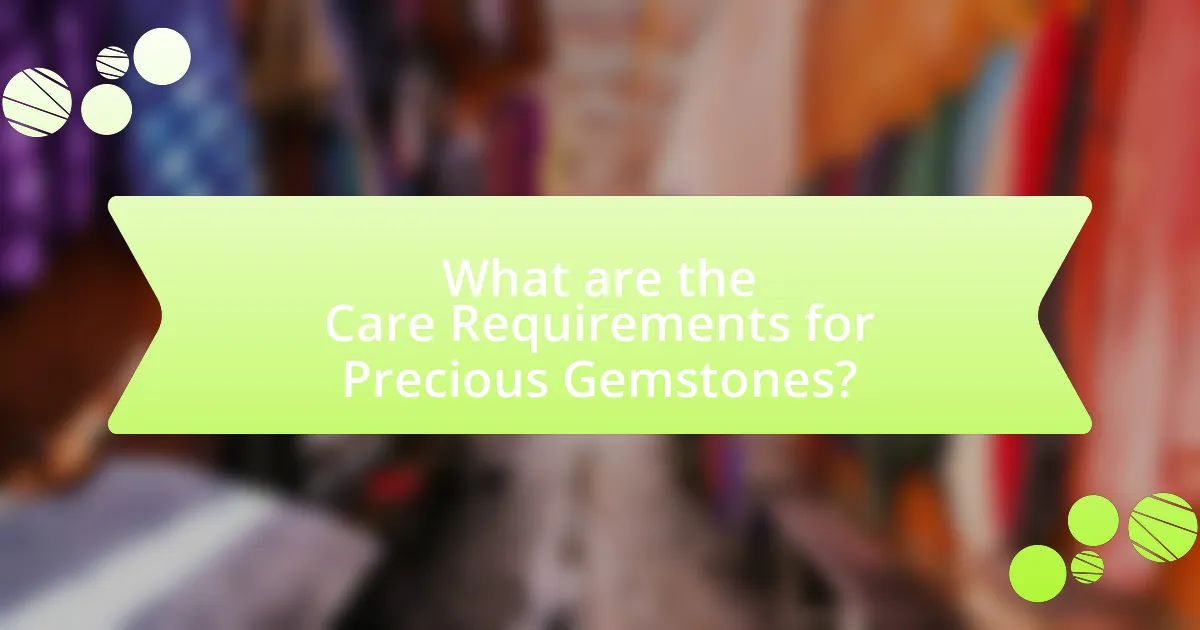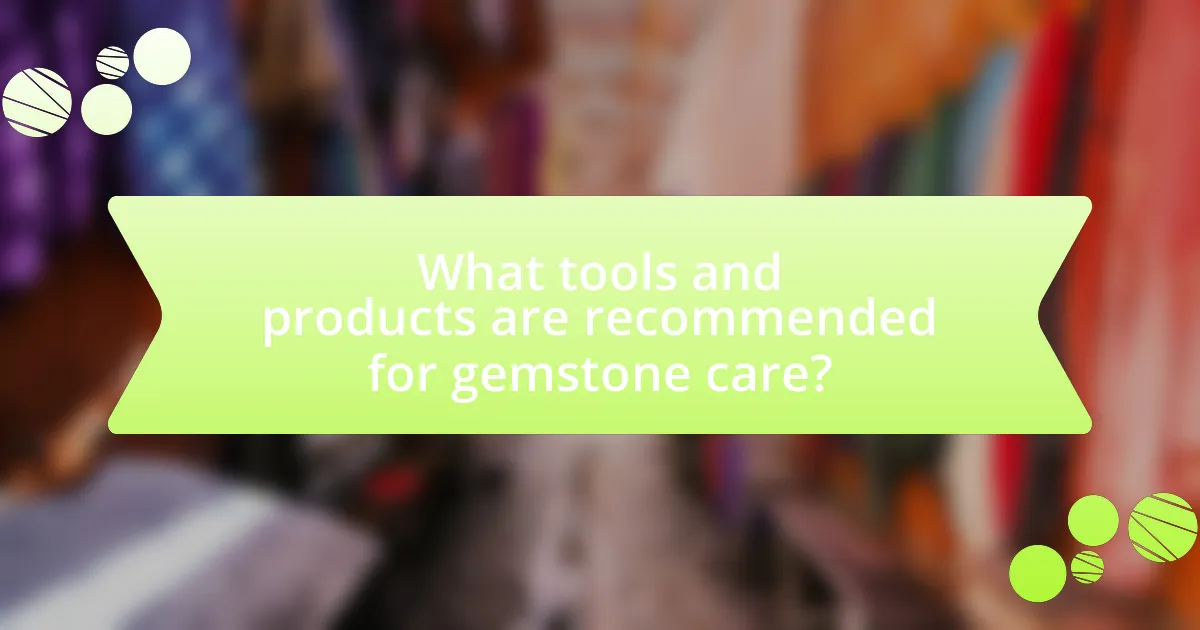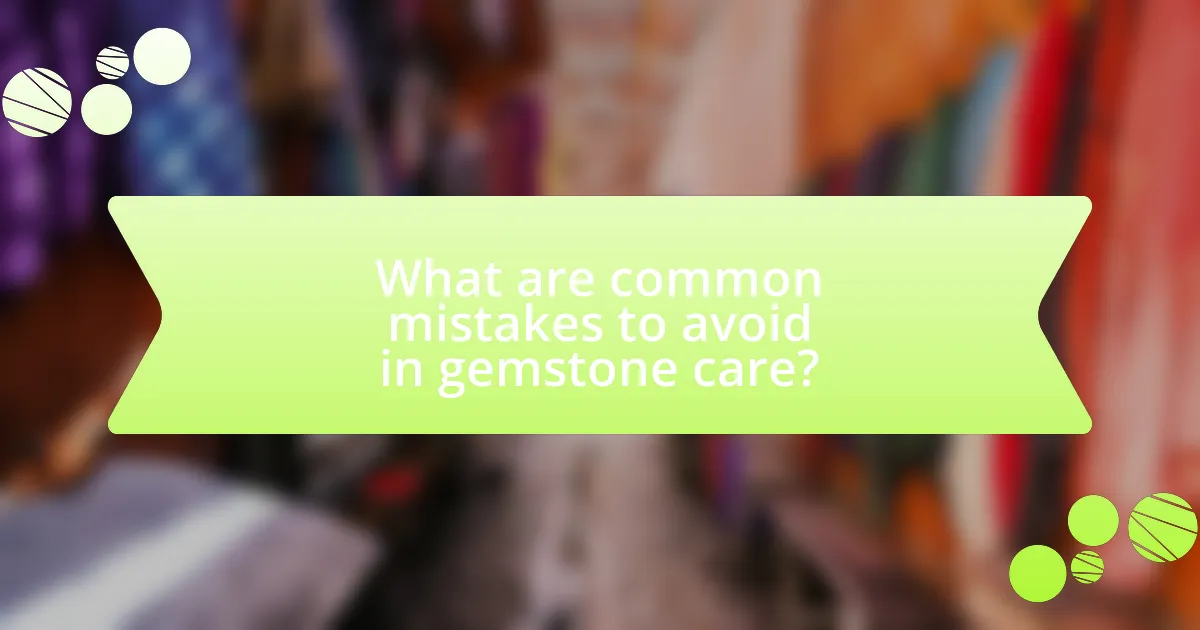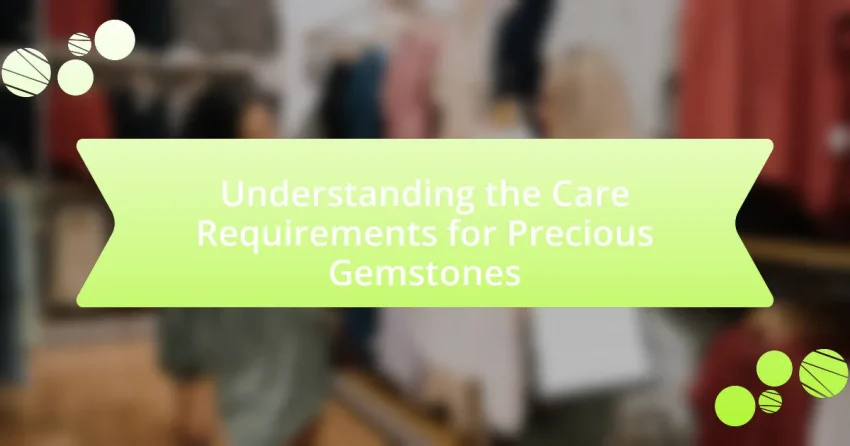The article focuses on the care requirements for precious gemstones, emphasizing the importance of proper handling, cleaning, and storage to maintain their beauty and integrity. It outlines general care practices applicable to all gemstones, as well as specific requirements for different types, including diamonds, pearls, and opals. The article also discusses the risks associated with neglecting gemstone care, such as scratches, discoloration, and structural damage, while providing practical tips for cleaning and storing gemstones effectively. Additionally, it highlights the role of environmental factors, such as humidity and sunlight, in gemstone preservation, and the significance of professional care when signs of damage are present.

What are the Care Requirements for Precious Gemstones?
Precious gemstones require careful handling, regular cleaning, and appropriate storage to maintain their beauty and integrity. To clean gemstones, use a soft cloth or a gentle brush with mild soap and warm water, avoiding harsh chemicals that can damage the stone. For storage, keep gemstones in a soft pouch or a separate compartment in a jewelry box to prevent scratching. Additionally, avoid exposing gemstones to extreme temperatures or direct sunlight for prolonged periods, as these conditions can affect their color and clarity. Regular inspections for any signs of damage or loose settings are also essential to ensure their longevity.
Why is proper care essential for precious gemstones?
Proper care is essential for precious gemstones because it preserves their beauty, integrity, and value over time. Gemstones are often subjected to scratches, chips, and discoloration due to environmental factors and improper handling. For instance, diamonds, while hard, can still be damaged by hard impacts or exposure to harsh chemicals, which can dull their brilliance. Regular cleaning and safe storage protect gemstones from dirt and physical damage, ensuring they maintain their aesthetic appeal and market value. Additionally, gemstones like emeralds and opals are more porous and require specific care to prevent damage from moisture and oils, highlighting the importance of tailored maintenance practices.
What risks do gemstones face without proper care?
Gemstones face several risks without proper care, including scratches, discoloration, and structural damage. Scratches can occur from contact with harder materials, leading to a loss of luster and beauty. Discoloration may result from exposure to chemicals, sunlight, or extreme temperatures, which can alter the gemstone’s appearance. Structural damage, such as chips or fractures, can happen due to improper handling or storage, compromising the integrity of the gemstone. These risks highlight the importance of regular maintenance and appropriate storage conditions to preserve the quality and value of gemstones.
How does care impact the longevity of gemstones?
Care significantly impacts the longevity of gemstones by preventing damage and maintaining their appearance. Proper care includes regular cleaning, safe storage, and avoiding exposure to harsh chemicals or extreme temperatures, which can cause scratches, discoloration, or structural damage. For instance, cleaning gemstones with a soft cloth and mild soap can help preserve their luster, while storing them separately in a soft pouch or box prevents scratches from contact with other jewelry. Research indicates that gemstones like diamonds can last indefinitely with proper care, as their hardness protects them from wear, but neglect can lead to irreversible damage.
What are the general care practices for all gemstones?
General care practices for all gemstones include cleaning, proper storage, and avoiding exposure to harsh chemicals. Regular cleaning with a soft cloth and mild soap helps maintain their luster, while storing gemstones separately in soft pouches or boxes prevents scratches and damage. Additionally, gemstones should be kept away from extreme temperatures and direct sunlight to avoid fading or cracking. These practices are essential for preserving the beauty and integrity of gemstones over time.
How should gemstones be cleaned safely?
Gemstones should be cleaned safely using a mild soap solution and a soft brush. This method effectively removes dirt and oils without damaging the stone. For most gemstones, a mixture of warm water and a few drops of gentle dish soap is sufficient. Soft brushes, such as a toothbrush with soft bristles, can be used to gently scrub the surface, ensuring that no harsh chemicals or abrasive materials are involved, as these can scratch or dull the gemstone’s surface.
What storage methods are best for preserving gemstones?
The best storage methods for preserving gemstones include using individual soft pouches, padded boxes, or specialized gemstone storage cases. These methods prevent scratches and damage by keeping gemstones separated and cushioned. For example, storing gemstones in a soft pouch made of fabric like velvet or silk minimizes friction and protects against dust and moisture. Additionally, using a padded box with compartments ensures that each gemstone is securely held in place, reducing the risk of impact damage. Proper storage conditions, such as maintaining a stable temperature and humidity level, further enhance the preservation of gemstones by preventing deterioration.
What specific care requirements exist for different types of gemstones?
Different types of gemstones have specific care requirements to maintain their beauty and integrity. For example, diamonds require regular cleaning with mild soap and water, avoiding harsh chemicals that can damage their brilliance. Pearls, being organic gems, need gentle handling and should be wiped with a soft cloth after wearing to remove oils and dirt, as they can be easily scratched. Opals are sensitive to temperature changes and should be stored in a stable environment to prevent cracking. Additionally, colored gemstones like rubies and sapphires can be cleaned with warm soapy water, but should avoid ultrasonic cleaners that may cause damage. Each gemstone’s unique properties dictate its care, ensuring longevity and preserving its aesthetic appeal.
How do care requirements differ between diamonds and softer gemstones?
Diamonds require less frequent care compared to softer gemstones due to their hardness, rated 10 on the Mohs scale, making them resistant to scratches and damage. In contrast, softer gemstones, such as opals or pearls, which range from 2.5 to 7.5 on the Mohs scale, are more susceptible to scratches, chips, and other forms of damage, necessitating more careful handling and regular maintenance. For instance, softer gemstones often require protective settings and should be stored separately to avoid contact with harder materials, while diamonds can be stored together without significant risk of damage.
What unique considerations are there for organic gemstones like pearls?
Organic gemstones like pearls require unique considerations due to their biological origin and sensitivity to environmental factors. Unlike traditional gemstones, pearls can be damaged by exposure to chemicals, extreme temperatures, and physical abrasion. For instance, pearls should be kept away from perfumes, hairsprays, and cleaning agents, as these substances can erode their surface and diminish their luster. Additionally, pearls are porous and can absorb moisture, which makes them susceptible to changes in humidity and temperature; therefore, they should be stored in a soft cloth or a dedicated jewelry box to prevent scratches and maintain their quality.
How can environmental factors affect gemstone care?
Environmental factors can significantly affect gemstone care by influencing their durability and appearance. For instance, exposure to extreme temperatures can cause thermal shock, leading to cracks or fractures in gemstones. Additionally, high humidity levels can promote the growth of mold or mildew on porous stones, while excessive sunlight can fade the color of certain gemstones over time. These effects underscore the importance of storing gemstones in controlled environments to maintain their integrity and aesthetic appeal.
What role does humidity play in gemstone preservation?
Humidity plays a critical role in gemstone preservation by influencing the stability and integrity of gemstones. High humidity can lead to moisture absorption in porous gemstones, which may cause deterioration, discoloration, or even structural damage over time. For instance, gemstones like opals and pearls are particularly susceptible to changes in humidity, as excessive moisture can lead to cracking or loss of luster. Conversely, low humidity can result in drying out and cracking in certain stones, such as turquoise. Therefore, maintaining an optimal humidity level, typically between 40% and 60%, is essential for preserving the quality and longevity of gemstones.
How does exposure to sunlight impact gemstones?
Exposure to sunlight can cause fading and discoloration in certain gemstones. For example, amethyst and topaz can lose their vibrant colors when exposed to prolonged sunlight, as ultraviolet rays break down the chemical bonds in the minerals. This phenomenon is well-documented in gemology, where it is noted that gemstones like kunzite and fluorite are particularly sensitive to light exposure, leading to significant color changes over time. Therefore, it is essential to store gemstones away from direct sunlight to preserve their natural beauty and integrity.

What tools and products are recommended for gemstone care?
Recommended tools and products for gemstone care include a soft microfiber cloth, a gentle gemstone cleaner, and a soft-bristle brush. The microfiber cloth effectively removes dust and oils without scratching the surface of the gemstone. A gentle gemstone cleaner, specifically formulated for the type of gemstone, ensures safe cleaning without damaging the stone’s integrity. Additionally, a soft-bristle brush can help clean intricate settings and hard-to-reach areas without causing harm. These tools are essential for maintaining the appearance and longevity of precious gemstones.
What cleaning solutions are safe for gemstones?
Safe cleaning solutions for gemstones include mild soap and water, isopropyl alcohol, and specialized gemstone cleaners. Mild soap and water effectively remove dirt without damaging the stone, while isopropyl alcohol can safely clean certain gemstones like diamonds and sapphires. Specialized gemstone cleaners are formulated to be gentle on various types of stones, ensuring their integrity is maintained. It is important to avoid harsh chemicals, ultrasonic cleaners, and steam cleaning, as these can cause damage to softer or porous gemstones.
How do different cleaning methods affect gemstone integrity?
Different cleaning methods can significantly affect gemstone integrity by altering their physical and chemical properties. For instance, ultrasonic cleaners can cause fractures in softer stones like opals and pearls due to the intense vibrations, while steam cleaning can damage porous stones such as turquoise by forcing water into their structure. Additionally, harsh chemicals can lead to discoloration or surface degradation in sensitive gemstones like emeralds and amethysts. Research indicates that specific cleaning methods should be tailored to the hardness and composition of each gemstone to maintain their integrity and appearance.
What tools are essential for maintaining gemstone appearance?
Essential tools for maintaining gemstone appearance include a soft microfiber cloth, a gentle brush, and a mild soap solution. The microfiber cloth effectively removes dust and fingerprints without scratching the surface, while the gentle brush helps clean intricate settings and hard-to-reach areas. A mild soap solution, typically mixed with water, is safe for cleaning most gemstones without causing damage. Regular use of these tools helps preserve the luster and clarity of gemstones, ensuring they remain visually appealing over time.
How can one identify the right care products for specific gemstones?
To identify the right care products for specific gemstones, one must first understand the unique properties and hardness of each gemstone. For instance, softer stones like opals require gentle cleaners, while harder stones like diamonds can withstand more abrasive products. Research indicates that using pH-balanced cleaners is essential for maintaining the integrity of gemstones, as harsh chemicals can cause damage. Additionally, consulting gemological resources or professional jewelers can provide tailored recommendations based on the specific gemstone’s characteristics, ensuring the selected care products are appropriate and effective.
What labels or certifications should consumers look for in care products?
Consumers should look for labels or certifications such as “Certified Organic,” “Cruelty-Free,” and “Non-Toxic” in care products. These labels indicate that the products meet specific standards for safety and ethical production. For example, “Certified Organic” ensures that ingredients are grown without synthetic pesticides or fertilizers, while “Cruelty-Free” confirms that no animal testing was involved in the product’s development. Additionally, “Non-Toxic” signifies that the product does not contain harmful chemicals, which is crucial for the safety of both consumers and the environment.
How can one determine the compatibility of a product with their gemstone?
To determine the compatibility of a product with a gemstone, one should first identify the chemical composition and hardness of the gemstone. Different gemstones have varying sensitivities to chemicals and physical abrasions. For instance, diamonds, rated 10 on the Mohs scale, can withstand most cleaning products, while softer stones like turquoise, rated 5-6, may be damaged by harsh chemicals.
Research indicates that using pH-neutral cleaners is generally safe for most gemstones, while acidic or alkaline substances can harm sensitive stones. Additionally, consulting gemstone care guides or professional gemologists can provide specific recommendations tailored to individual gemstones. This approach ensures that the chosen product will not adversely affect the gemstone’s integrity or appearance.

What are common mistakes to avoid in gemstone care?
Common mistakes to avoid in gemstone care include using harsh chemicals, exposing gemstones to extreme temperatures, and neglecting regular cleaning. Harsh chemicals can damage the surface of gemstones, leading to dullness or discoloration; for example, bleach can harm pearls and opals. Extreme temperatures can cause thermal shock, particularly in stones like quartz, which may crack. Regular cleaning is essential, as neglect can lead to the buildup of dirt and oils that diminish a gemstone’s brilliance. Proper care involves using gentle soap and water, avoiding ultrasonic cleaners for delicate stones, and storing gemstones separately to prevent scratches.
What are the most frequent errors made when caring for gemstones?
The most frequent errors made when caring for gemstones include using harsh chemicals, exposing them to extreme temperatures, and neglecting regular cleaning. Harsh chemicals can damage the surface of gemstones, leading to dullness or discoloration; for example, bleach can harm pearls and opals. Extreme temperatures can cause thermal shock, particularly in stones like quartz, which may crack or shatter. Neglecting regular cleaning allows dirt and oils to accumulate, diminishing the gemstone’s brilliance and clarity. Proper care involves using gentle soap and water, avoiding extreme conditions, and maintaining a consistent cleaning routine to preserve the integrity and appearance of gemstones.
How can improper cleaning techniques damage gemstones?
Improper cleaning techniques can damage gemstones by causing scratches, dullness, or even structural damage. For instance, using abrasive materials or harsh chemicals can erode the surface of softer stones like opals or pearls, leading to irreversible damage. Additionally, ultrasonic cleaners can fracture certain gemstones, such as emeralds or turquoise, due to their internal inclusions. Research indicates that specific cleaning methods should be tailored to the hardness and composition of each gemstone to prevent such damage.
What storage mistakes can lead to gemstone deterioration?
Improper storage conditions can lead to gemstone deterioration. Storing gemstones in direct sunlight can cause fading or discoloration, particularly in stones like amethyst and topaz. Additionally, placing gemstones in damp or humid environments can promote mold growth and cause damage to softer stones. Storing different types of gemstones together without protective barriers can result in scratches and abrasions due to harder stones damaging softer ones. Lastly, neglecting to clean gemstones before storage can lead to the buildup of dirt and oils, which can degrade the stone over time.
What best practices should be followed for gemstone care?
To ensure optimal gemstone care, it is essential to follow specific best practices. Regular cleaning with a soft cloth and mild soap helps maintain the gemstone’s luster without causing damage. Avoid exposing gemstones to harsh chemicals, as substances like bleach or ammonia can harm their surface. Storing gemstones separately in soft pouches or lined boxes prevents scratches and damage from contact with other jewelry. Additionally, having gemstones professionally inspected and cleaned annually can help identify any potential issues early, ensuring their longevity. These practices are supported by gemological experts who emphasize the importance of proper maintenance for preserving the beauty and integrity of precious stones.
How often should gemstones be cleaned and inspected?
Gemstones should be cleaned and inspected at least every six months. Regular cleaning helps maintain their brilliance and prevents the buildup of dirt and oils, while inspections can identify any damage or loose settings that may require professional attention. This frequency is supported by gemological experts who recommend routine maintenance to preserve the integrity and appearance of gemstones.
What routine maintenance can enhance the beauty of gemstones?
Routine maintenance that can enhance the beauty of gemstones includes regular cleaning, proper storage, and periodic professional inspections. Cleaning gemstones with a soft cloth and mild soap solution removes dirt and oils that can dull their appearance. Proper storage in a soft pouch or a separate compartment prevents scratches and damage from other jewelry. Additionally, professional inspections can identify any potential issues, such as loose settings or damage, ensuring that the gemstones remain in optimal condition. These practices are essential for maintaining the luster and overall aesthetic appeal of gemstones.
What are the signs that a gemstone needs professional care?
A gemstone needs professional care when it shows signs of damage, such as visible scratches, chips, or cracks. These physical imperfections indicate that the gemstone’s integrity may be compromised, affecting its appearance and value. Additionally, if a gemstone appears dull or loses its luster despite regular cleaning, it may require professional polishing or treatment to restore its shine. Furthermore, if a gemstone has developed discoloration or cloudiness, this can signal the need for specialized cleaning or restoration techniques that only professionals can provide.
How can one recognize when a gemstone is damaged or dull?
A gemstone can be recognized as damaged or dull when it exhibits visible scratches, chips, or a lack of luster. Scratches and chips disrupt the surface, causing light to scatter unevenly, which diminishes the stone’s brilliance. Additionally, a dull appearance often results from a buildup of dirt, oil, or residue, which can be identified by a lack of sparkle or clarity. Regular inspection under good lighting can help in detecting these issues, as well as comparing the gemstone to a known, well-maintained example of the same type.
What services do professional gemologists offer for gemstone care?
Professional gemologists offer a range of services for gemstone care, including cleaning, appraisal, repair, and restoration. Cleaning services involve using specialized techniques and solutions to safely remove dirt and oils without damaging the gemstone. Appraisal services provide an expert evaluation of a gemstone’s quality, value, and authenticity, which is essential for insurance and resale purposes. Repair services address issues such as chipped or broken stones, while restoration can involve re-polishing or resetting gemstones to restore their original beauty. These services are crucial for maintaining the integrity and appearance of precious gemstones, ensuring they remain in optimal condition over time.
What practical tips can help maintain precious gemstones effectively?
To maintain precious gemstones effectively, regularly clean them with a mild soap solution and a soft brush to remove dirt and oils. This method is recommended because harsh chemicals can damage the stones, while gentle cleaning preserves their luster. Additionally, store gemstones separately in soft pouches or lined boxes to prevent scratches and damage from other jewelry. This practice is essential as gemstones can be vulnerable to physical impacts and abrasion. Finally, avoid exposing gemstones to extreme temperatures or direct sunlight for prolonged periods, as these conditions can lead to fading or cracking. These tips are supported by gemological guidelines that emphasize the importance of proper care to ensure the longevity and beauty of precious gemstones.
